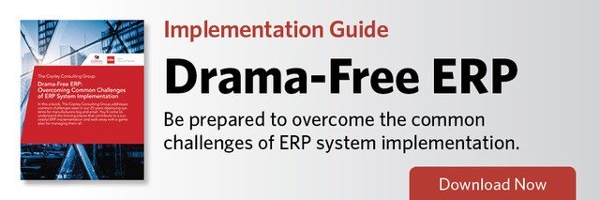Planning to expand your global footprint? First, ensure your ERP system is ready to support operations in international markets.
The term “globalization” used to be one used only by large corporations. International markets were once a sandbox exclusive to big businesses, where small and midsize businesses dare not venture. Today, progressive SMB manufacturers recognize that having an international presence is becoming synonymous with remaining competitive. Expanding your global footprint requires some investment, but like everything in business today, many of the logistics involved can be handled virtually. Adopting the right ERP system can help. Here’s how.
Global Business & ERP
Globalizing can mean different things to different manufacturers.  For some, it may mean opening new overseas sales offices but continuing to conduct business in a single domestic facility. For others, it’s opening production facilities in new international locations. In either case, certain decisions will need to be made. For example, will the different locations be set up as separate entities or will they function under a single corporate umbrella? The answer to this question will help determine what level of integration must occur between the facilities. The integration of your business processes and operations can be facilitated through a properly configured ERP system. However, you’ll first need to ensure your ERP solution has the capabilities needed to meet the requirements of each country in which you do business.
For some, it may mean opening new overseas sales offices but continuing to conduct business in a single domestic facility. For others, it’s opening production facilities in new international locations. In either case, certain decisions will need to be made. For example, will the different locations be set up as separate entities or will they function under a single corporate umbrella? The answer to this question will help determine what level of integration must occur between the facilities. The integration of your business processes and operations can be facilitated through a properly configured ERP system. However, you’ll first need to ensure your ERP solution has the capabilities needed to meet the requirements of each country in which you do business.
Must-Have ERP Features for Globalization
When operating a business in multiple locations, your ERP system may need to be customized to meet the requirements of each location – including language, function and regulatory needs. Below are three features to look for in globalization-friendly ERP solutions:
- Country Pack. When setting up shop in a new country, companies must comply with local laws and regulations to complete their daily transactions and operations. ERP country packs are specialized solutions that contain country-specific code to help with localizations. They typically include features that are legally required in that specific country as well as those help you localize your general features for use in a particular location. Such features can aid in rapid implementation when breaking into international markets as well as help manufacturers keep up with changing laws and regulations in each business location. In addition, use of country packs can lower your total cost of ownership because you’re using the same base technology and interface across locations, enabling a lightweight solution for a heavyweight application.
- Shared Services Model. Despite your business being conducted across multiple locations, there may be certain centralized responsibilities that will remain shared among your business entities. From accounting to human resources, a modern ERP system should help you achieve this by allowing individual site transactions to be recorded in a single system without users having to log in and out of multiple databases.
- Financial Consolidation. An ERP system can help simplify your finances across multiple locations with flexible configuration options. For example, Infor CloudSuite™ Industrial allows each location to be set up as an “entity,” which can help you customize your approach to financials when dealing with multiple currencies. You can also ensure a consolidated approach to financial reporting, while conforming with GAAP and IFRS standards.
Taking the leap into a new geographic market undoubtedly comes with risks. However, if your ERP system is set up to meet the statutory and regulatory requirements of your new location, then you can increase your odds of operating in a compliant manner from day one. Choose an ERP software partner with international expertise so you are set up for success, no matter where your business takes you in the years ahead.

